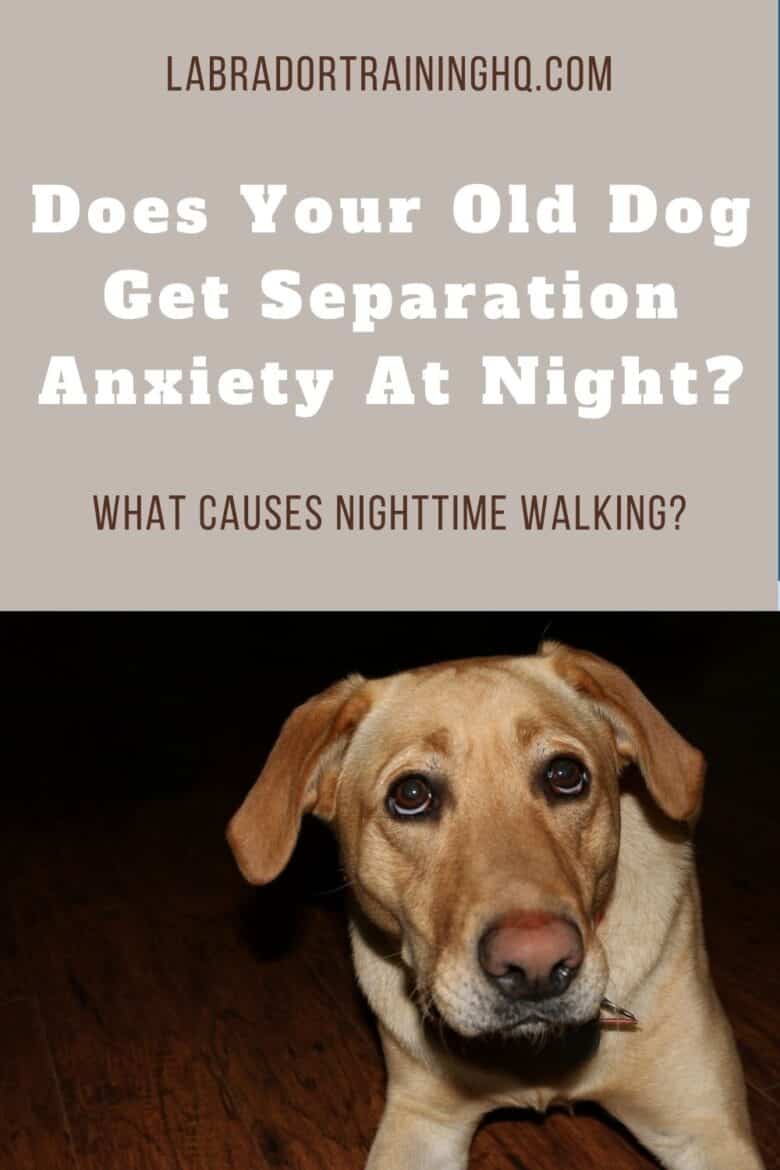This post may contain affiliate links. We may earn money or products from the companies mentioned in this post.
When the night arrives and you settle into bed, the only thing you expect to hear from your dog are their quiet snores.
This was exactly what I expected, until one night the sounds of my dog’s restless whining, pacing, pawing, and panting woke me up.
For me and my pup, this was just the first of many sleepless nights brought on by senior dog anxiety at night.
Considering that my dog is well into his senior years, I thought he woke up in the middle of the night to go potty, but that wasn’t it.

After more pacing, whining, and barking, I determined that he wasn’t in pain. After ruling out all the usual suspects, I was no closer to the root of the problem and that was our first sleepless night.
As it turns out, dog nighttime anxiety is a common occurrence in elderly dogs and is a problem that can affect the entire family. Being sleep-deprived night after night is frustrating, and can affect your and your dog’s health.
Unfortunately, as your dog gets older you may notice that their nighttime anxiety is becoming increasingly frequent and happens almost every night.
Senior dogs can experience a variety of problems as they get older, and they often get anxious at night. In this article, I will tell you what can cause your elderly pooch to feel anxious and what you can do to help.
Contents & Quick Navigation
What Causes Anxiety In Older Dogs At Night?
Aging is a natural process for both dogs and people. Most people expect to see signs of slowing down, mobility issues, and a few gray hairs in their elderly dogs. However, only a few owners are really prepared for everything old age has in store for their dogs.
As they age, dogs often experience behavioral changes and a decline in functioning. Due to this, it’s not uncommon for a dog that has always been confident to show signs of anxious behavior or to develop separation anxiety.
When your dog gets older, their memory and senses of smell, hearing, and sight start to deteriorate and can make them feel anxious. Nighttime anxiety in dogs is sometimes triggered by the natural aging process, but it can also be caused by psychological or physical problems.
Below are the most likely causes for your dog’s restless and anxious behavior at night:
1. Pain
As your dog gets older, they may develop several health problems along the way. Some of these conditions can cause pain and discomfort, which in turn can make them feel anxious and restless.
Even if your dog isn’t suffering from any health problems, just the normal aches and pains associated with aging can make it hard for them to relax and sleep throughout the night.
Painful conditions such as arthritis and some forms of cancer can prevent your dog from lying in the same position for an extended period of time, thus disrupting their sleep. Dogs that can’t get comfortable will become restless and may pant, whine, and bark to get your attention.
Your senior dog relies on you to provide aid and comfort, so if you suspect that your pooch is in pain, call your vet. The veterinarian can’t stop the aging process completely, but they can help alleviate age- related aches and pains.
If you suspect that your dog’s pain is caused by an underlying health condition, take them to the vet for a full physical exam. Don’t forget to mention any changes you see in your dog to your vet, since behavioral changes can be signs of treatable medical conditions.
There are a variety of treatments that can manage your dog’s symptoms, including any pain that causes them anxiety at night and keeps them awake.
If pain is the cause of your dog’s anxiety at night, you should notice a huge improvement in their behavior once the pain is properly managed. Without the pain that kept them awake, your elderly pup will sleep soundly throughout the night—and so will you.
2. Cognitive Dysfunction
Cognitive dysfunction in dogs causes similar symptoms as Alzheimer’s disease in people. This slow and progressive disorder is a common cause of nighttime anxiety in older dogs.
Older dogs with cognitive dysfunction may exhibit a multitude of psychological and physical symptoms. These include difficulty with memory, confusion, restlessness, irritability, changes in sleep patterns, loss of appetite, disorientation, and more.
Just thinking about this list of symptoms can make you feel anxious. Imagine how scared you would be, waking up in the middle of the night not knowing where you are and how you got there!
That’s the same fear a dog with cognitive dysfunction experiences every time they wake during the night, confused and disoriented. Being alone in the dark, not knowing where they are, is bound to make your dog anxious and cause them to pant, whine, bark, and pace.
Additionally, cognitive dysfunction may also cause changes in your dog’s sleeping pattern. You may notice that your dog is sleeping a lot during the day, but sleeps restlessly or stays awake at night.
Unfortunately, there is no test for cognitive dysfunction in dogs, and other brain diseases such as tumors and meningitis can present with similar symptoms. Therefore, your vet will have to rule out other conditions based on your dog’s symptoms to diagnose cognitive dysfunction.
For dogs with cognitive dysfunction, there is no cure and treatment options are limited, to say the least. Certain medications and fish oil supplements may slow your dog’s cognitive decline and lessen the symptoms.
Since nighttime anxiety is often the scariest symptom of cognitive dysfunction for senior dogs, your vet may recommend anti-anxiety medications. In most cases, anti-anxiety meds provide much-needed relief for both the dog and the owner, but they don’t always work.
If, despite your best efforts and treatment, your pooch continues to wake up and feel anxious during the night, you should consider their quality of life. It may be far more humane to put your dog to sleep than watch as their cognitive functions decline.
3. Loss Of Bladder & Bowel Control
For a dog that was properly housetrained, the loss of bladder and bowel control can cause serious anxiety. A potty-trained dog knows that they aren’t allowed to pee and poop inside the house, and when the accident happens, your pooch will know they did something wrong.
However, as your dog gets older, their organs stop functioning the same as before and loss of bladder and bowel control is to be expected. An older dog’s whining at night may be a sign that your pooch can’t hold it any longer and needs to go out.
Your dog may also start pacing and pawing at the front door to get your attention and communicate that they need to go out. You may also notice that your dog is just standing by the door and panting.
As senior dogs start to lose bladder and bowel control, they will have an increased need to eliminate. A clear sign that your dog is becoming incontinent is if they can’t hold it between their regular walks. And if your pooch can’t hold it during the day, they won’t be able to hold it throughout the whole night.
If your senior dog is panting at night due to an increased need to urinate and defecate, you should take them to the vet so they can rule out any potential health problems. Medical conditions such as kidney disease and urinary tract infections can affect your dog’s bladder control.
Most of these medical conditions can be diagnosed or ruled out by a physical exam, blood tests, and urinalysis. Upon receiving the diagnosis, you and your vet can come up with an appropriate treatment plan.
If your dog’s lack of bladder control is caused by the natural aging process, you can curb your dog’s nighttime anxiety by taking them for potty breaks frequently.
Make sure that your dog goes outside just before bedtime, even if they went for a regular evening walk. You should also consider limiting the amount of water your dog drinks before going to bed.
Additionally, it’s never too late to start training your dog to use pee pads. This way, your pooch will have a designated bathroom spot inside the house. So even if your dog wakes up in the middle of the night, they will use the pee pad and go back to sleep without experiencing any anxiety or stress.
4. Failing Senses
Like older people, senior dogs start to lose their senses and have trouble hearing and seeing. But unlike us humans, dogs can’t get a brand new pair of glasses or a hearing aid that can combat the effects of aging.
The effects of fading eyesight and hearing can be terrifying for older dogs and may become exacerbated during the night. An older dog with cataracts may not have much trouble during the day, but things can be completely different in the dark.
Not being able to see where they are and where they are going can make your dog extremely anxious during the night. Not to mention, your pooch may stumble in the dark or get injured by falling down the stairs.
Dogs with decreased hearing can experience the same level of anxiety and start to whine, bark, or howl. If your dog isn’t completely deaf, they may be comforted by the sounds of the busy household during the day. But when everyone goes to sleep and the house becomes quiet, your pooch may think they are all alone.
There are a couple of things you can do to comfort your dog if you suspect that their nighttime anxiety is caused by failing senses.
Leaving a nightlight on can soothe dogs with fading eyesight and make it easier for them to move around the house during the night. Additionally, leaving a TV or radio on and creating some white noise can help calm an anxious dog.
How To Help An Anxious Dog To Sleep Throughout The Night?
There are several things you can do to help calm your restless dog during the night. But first, you should take your senior pet to the vet, so they can rule out any cognitive and medical conditions that might be the cause of your dog’s anxiety.
If no health condition is identified, here are some simple things you should try:
Maintain A Predictable Routine
Dogs are creatures of habit, but older dogs can especially benefit from an established routine. Any discrepancy in your dog’s routine can make your dog anxious, so stick to a regular and predictable feeding schedule, walks, and bedtime.
Comfortable Bed
A high-quality orthopedic bed can go a long way in keeping your senior pooch comfortable at night, especially if they have mobility problems. Make sure the bed is soft and warm enough, and consider adding a blanket or a heating pad for extra comfort and security.
Natural Anti-Anxiety Relief
There are many natural anti-anxiety products that have calming effects and can help soothe your dog during the night. Essential oils, pheromone diffusers, and collars are completely natural and safe anti-anxiety treatments with calming effects.
Security Object
Make sure that your dog has their favorite toys, blankets, and belongings close by during the night. Additionally, you can let your dog sleep with an old piece of clothing that has your smell on it. Having something that smells like you can soothe your pooch and give them comfort during the night.
Your Company
Senior dogs get very attached and dependent on their owners. If your dog gets restless during the night, your proximity, voice, or touch can help ease their anxieties. Consider moving your dog’s bed closer to yours, or even letting your dog sleep in your bed to help them stay calm at night.
Exercise
Regular exercise can improve your dog’s mood and help them sleep better at night. Since older dogs aren’t as energetic and agile as their young counterparts, adjust the intensity and duration of exercise based on your dog’s abilities.
FAQs About Dog Anxiety At Night
Why Do Older Dogs Get Anxious At Night?
Older dogs that feel anxious at night may start to pace, whine, bark, or pant for no apparent reason. Cognitive dysfunction is often the cause of restlessness in older dogs and the reason they wake up at night. This is a slow and progressive condition, similar to dementia in older people.
While there is no cure for cognitive dysfunction, there are medications and supplements that can slow your dog’s cognitive decline. Additionally, you can try anti-anxiety medication or natural anxiety relief to help calm your dog.
Why Is My Dog Restless At Night All Of A Sudden?
Restless sleep is often seen in older dogs and can be caused by many different things. Medical conditions, including kidney disease, arthritis, and cognitive dysfunction, can affect your dog’s sleeping schedule.
Furthermore, age-related aches and pains can cause discomfort and prevent your dog from lying in the same position comfortably for an extended time.
How Do You Calm An Anxious Dog At Night?
After ruling out any potential medical conditions that can cause your dog anxiety, there are several things you can do to calm your pooch at night. A comfortable orthopedic bed, nightlight, quiet, calming music, and your company can help ease your dog’s anxiety.
If that doesn’t work, you can try natural anti-anxiety remedies such as essential oils and pheromone room diffusers, sprays, or collars. Supplementing your dog’s diet with omega 3 fatty acids may also help reduce their nighttime anxiety.
Why Won’t My Older Dog Sleep At Night?
Cognitive dysfunction is a common cause of nighttime waking in senior dogs. Dogs with this condition start sleeping more during the day and sleep restlessly during the night or stay awake. This is a progressive condition that affects a dog’s cognitive abilities and also leads to problems with memory and behavior.
Cognitive dysfunction is just one of many health problems that can affect your dog’s sleep schedule and keep them up at night. Pain, arthritis, kidney disease, and anxiety are often seen in senior dogs and can keep your dog awake during the night.
Why Is My Dog Walking Around At Night?
Dogs can become restless and start walking during the night for several reasons. Most older dogs start pacing when they are anxious, need to go outside to pee, or can’t get comfortable due to pain. Senior dogs with cognitive dysfunction also tend to walk aimlessly during the night and may appear disoriented, confused, and scared.
Conclusion
Anxiety at night in senior dogs can progress slowly owner time or come out of the blue. Restless sleeping, pacing, panting, and vocalization are often seen in older dogs and are unfortunate byproductd of getting old. In most cases, nighttime anxiety in older dogs is caused by:
- Cognitive dysfunction
- Pain
- Failing senses
Figuring out what is making your dog anxious at night is the only way you can deal with their restless sleep. So take your dog to the vet today, and do everything you can to keep them calm and comfortable in their senior years.
Save To Pinterest

Top Picks For Our Dogs
- BEST PUPPY TOY
We Like: Snuggle Puppy w/ Heart Beat & Heat Pack – Perfect for new puppies. We get all of our Service Dog pups a Snuggle Puppy. - BEST CHEW TOY
We Like: KONG Extreme – Great toy for heavy chewers like our Labrador Retrievers. - BEST DOG TREATS
We Like: Wellness Soft Puppy Bites – One of our favorite treats for training our service dog puppies. - BEST FRESH DOG FOOD
We Like: The Farmer’s Dog – A couple months ago we started feeding Raven fresh dog food and she loves it! Get 50% off your first order of The Farmer’s Dog.
For a list of all the supplies we get for our new service dog puppies check out our New Puppy Checklist on the PuppyInTraining.com blog.
Senior Dog Anxiety At Night – What Causes Nighttime Waking? was last modified: March 21st, 2021 by


